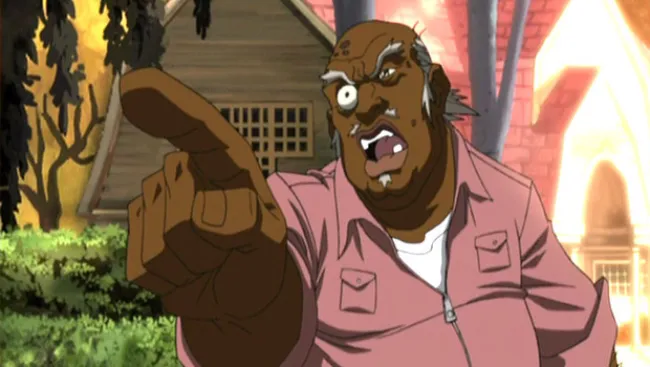Uncle Ruckus: A Satirical Exploration of The Boondocks’ Most Controversial Character
Uncle Ruckus, the infamous and controversial character from The Boondocks, stands as a biting satire of internalized racism. With his exaggerated disdain for Black culture and absurd reverence for whiteness, he forces viewers to confront uncomfortable truths about identity, systemic oppression, and the lingering scars of racism—all while delivering dark, unforgettable humor.
Uncle Ruckus: The Satire of Self-Loathing in The Boondocks
Uncle Ruckus, a character from Aaron McGruder’s animated series The Boondocks, is a masterful creation of satire. He embodies the extreme manifestation of internalized racism, representing the psychological toll of systemic oppression. With his relentless disdain for Black culture and comical idolization of whiteness, Ruckus is both absurdly humorous and deeply thought-provoking.
Defining Traits and Backstory
- Internalized Racism: Ruckus insists he has "reverse vitiligo," claiming his dark skin is a disease. He idolizes white supremacy and even fabricates Irish ancestry, despite DNA results proving he is "102% African."
- Troubled Upbringing: Raised by an abusive father and a mother consumed by internalized racism, Ruckus’ worldview was shaped by generational trauma. His mother’s rejection of Black identity left a profound mark on his sense of self.
- Symbolism: McGruder uses Ruckus to critique the psychological effects of systemic racism. His glass eye—a literal lack of depth perception—symbolizes his inability to see beyond harmful stereotypes, reducing his worldview to a narrow and shallow perspective.
Criticism and Cultural Reactions
Uncle Ruckus’ exaggerated features, such as his broad nose and dark skin, have sparked debate. Critics argue that these elements risk perpetuating harmful stereotypes, overshadowing the social critique he embodies. However, his absurdity also mirrors real-world figures like Jesse Lee Peterson and James David Manning, who similarly espouse anti-Black rhetoric, reinforcing the character’s satirical purpose.
Gary Anthony Williams: The Voice Behind Uncle Ruckus
Gary Anthony Williams, a talented actor and comedian, provides the unforgettable voice of Uncle Ruckus. His skill and versatility breathe life into the character, making him both iconic and impactful.
- Notable Roles: In addition to Ruckus, Williams has voiced characters like General Horace Warfield in StarCraft II and Mr. McStuffins in Doc McStuffins. He is also a regular performer on Whose Line Is It Anyway?
- Improv Expertise: As a founding member of Atlanta’s Laughing Matters improv troupe, Williams’ comedic timing amplifies Ruckus’ outrageous rants. His ad-libbed lines often enhance the character’s absurdity.
- Fun Fact: Williams stumbled into acting due to a high school scheduling error that placed him in a drama class—a happy accident that launched his career.
Uncle Ruckus’ Music: Satirical Racist Anthems
Music is a key element of Uncle Ruckus’ character, with his songs serving as biting critiques of racist ideologies.
“Don’t Trust Them New N*as Over There”:
- Context: Debuting in the series pilot, this song mocks racist paranoia as Ruckus warns white neighbors about the Freemans. He later reframes it as a faux “spiritual,” a notion Huey Freeman quickly debunks.
- Lyrics: Lines like “Them happy, nappy-head n**as / With they fingas on the trigga!” ridicule both historical and modern racial fears.
“The President’s a N*er” (with Jimmy Rebel):
- Context: In The Story of Jimmy Rebel, Ruckus collaborates with a parody of Johnny Rebel, creating a song targeting Barack Obama. The lyrics combine slurs with absurd imagery, such as “chicken bone sucker, blue-black spear chucker.”
- Message: This satirical piece highlights how racism evolves to target new figures, exposing its irrationality through humor.
Legacy and Impact
Uncle Ruckus remains one of the most polarizing figures in The Boondocks. While his lack of a redemption arc frustrates some viewers, his role is clear: to act as a satirical reflection of the psychological scars left by systemic racism. With Gary Anthony Williams’ stellar performance and McGruder’s incisive writing, Ruckus challenges audiences to confront uncomfortable truths about race and identity.
Whether he makes you laugh, cringe, or seethe, Uncle Ruckus ensures that the conversation about race in America remains urgent, provocative, and unflinchingly relevant.
